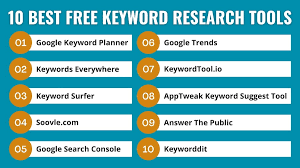The Power of Using Keyword Tool SEO Google
In the world of Search Engine Optimization (SEO), keywords play a crucial role in determining the visibility and ranking of your website on search engine results pages. One powerful tool that can help you in your keyword research and optimization efforts is the Keyword Tool provided by Google.
Google’s Keyword Tool is a free and user-friendly tool that allows you to discover relevant keywords for your website or content. By entering a seed keyword or key phrase, the tool generates a list of related keywords along with valuable metrics such as search volume, competition level, and suggested bid.
Using Google’s Keyword Tool can provide you with insights into what users are searching for online, helping you tailor your content to meet their needs and improve your website’s SEO performance. By targeting the right keywords, you can attract more organic traffic to your site and increase your chances of ranking higher on search engine results pages.
Furthermore, Google’s Keyword Tool can help you identify long-tail keywords – longer and more specific keyword phrases – that are less competitive but highly targeted. Incorporating these long-tail keywords into your content can drive quality traffic to your site from users who are more likely to convert.
In conclusion, leveraging Google’s Keyword Tool as part of your SEO strategy can give you a competitive edge in optimizing your website for search engines. By conducting thorough keyword research and targeting the right keywords, you can enhance your online visibility, attract relevant traffic, and ultimately achieve greater success in the digital landscape.
Mastering SEO: 6 Essential Tips for Using Google Keyword Tools Effectively
- Use Google Keyword Planner for keyword research
- Focus on long-tail keywords for better targeting
- Analyze keyword search volume and competition levels
- Include relevant keywords in your website content
- Regularly update and optimize your keyword strategy
- Monitor keyword performance and make adjustments accordingly
Use Google Keyword Planner for keyword research
When delving into keyword research for SEO purposes, utilizing Google Keyword Planner can be a game-changer. This powerful tool offers valuable insights into search volume, competition levels, and suggested bids for keywords relevant to your content or website. By leveraging Google Keyword Planner, you can uncover strategic keywords to target, optimize your content effectively, and enhance your chances of improving search engine rankings.
Focus on long-tail keywords for better targeting
When utilizing the Keyword Tool in Google for SEO purposes, it is crucial to focus on long-tail keywords for more precise targeting. Long-tail keywords are specific and detailed phrases that cater to a niche audience, making them less competitive yet highly relevant. By incorporating long-tail keywords into your content strategy, you can effectively reach users who are actively searching for what your website offers, increasing the likelihood of driving quality traffic and achieving higher conversion rates.
Analyze keyword search volume and competition levels
Analyzing keyword search volume and competition levels is a crucial step in optimizing your website for search engines using Google’s Keyword Tool. By understanding the search volume of specific keywords, you can gauge the level of interest and demand from users, allowing you to prioritize high-traffic keywords in your content strategy. Additionally, evaluating competition levels helps you identify keywords that are less saturated, giving you a better chance to rank higher in search results. By striking the right balance between search volume and competition, you can effectively target keywords that drive organic traffic to your site while maximizing your SEO efforts.
Include relevant keywords in your website content
Including relevant keywords in your website content is a fundamental aspect of effective SEO strategy. By incorporating keywords that are closely related to your business, products, or services, you can signal to search engines what your website is about and improve its chances of ranking higher in search results. Ensuring that these keywords are seamlessly integrated into your content not only helps with search engine visibility but also enhances the user experience by providing valuable and relevant information to visitors. Remember, striking the right balance between keyword optimization and high-quality, engaging content is key to driving organic traffic and achieving SEO success.
Regularly update and optimize your keyword strategy
To maximize the effectiveness of your SEO efforts, it is essential to regularly update and optimize your keyword strategy. By staying proactive in monitoring keyword trends, conducting thorough research, and adjusting your strategy accordingly, you can ensure that your website remains competitive and relevant in search engine rankings. Regular updates and optimizations to your keyword strategy will help you stay ahead of the curve, attract more organic traffic, and improve overall visibility online.
Monitor keyword performance and make adjustments accordingly
Monitoring keyword performance is a critical aspect of any successful SEO strategy. By keeping a close eye on how your chosen keywords are performing in search engine results, you can gain valuable insights into what is working and what needs adjustment. Analyzing metrics such as search volume, competition level, and click-through rates allows you to identify trends and patterns that can guide your optimization efforts. Making timely adjustments based on this data ensures that your content remains relevant and competitive, ultimately improving your website’s visibility and ranking on search engine results pages.

